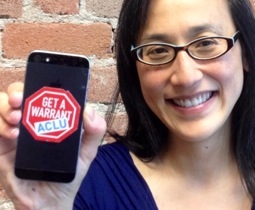ACLU Urges SF Federal Court to Tackle Warrantless Cell Tracking
Page Media

When the government demands that your cell phone carrier reveal information about where you’ve been, or where you’re going to go, they should get a warrant. Location information is exactly the kind of sensitive information that the Fourth Amendment is supposed to protect. That’s why we filed a “friend of the court” brief in the Northern District of California on Tuesday urging a federal magistrate judge to tell the government to come back with a warrant when asking for historical cell site location information.
Our cell phones constantly communicate with local cell phone towers. This information reveals a great deal of private and sensitive data about where we go, who we meet with, and more. It’s alarming that government requests for location data are rising. These requests typically lack a warrant based on probable cause and are often sealed by lower courts or decided in such a manner that prevents courts from addressing the important constitutional question at stake. Just because we choose to use a cell phone does not mean that we expect, or should accept, that our location data will end up in the government’s hands without probable cause.
But the times are a ‘changing. Our brief follows two recent and important rulings related to cell phones. In June (in a case the ACLU participated in), a federal appeals court ruled that obtaining cell site information without a warrant violated the Fourth Amendment. Weeks later in Riley v. California, the U.S. Supreme Court discussed the rich location histories generated by modern cell phones and it concluded that the government must get a warrant to search a phone incident to arrest. We hope that this local federal court will also make it clear that no one should be forced to give up their privacy to participate in the modern world.
Our “friend of the court” brief is available here.
The Federal Public Defender brief is available here.
Nicole A. Ozer is the Technology & Civil Liberties Policy Director with the ACLU of California.
